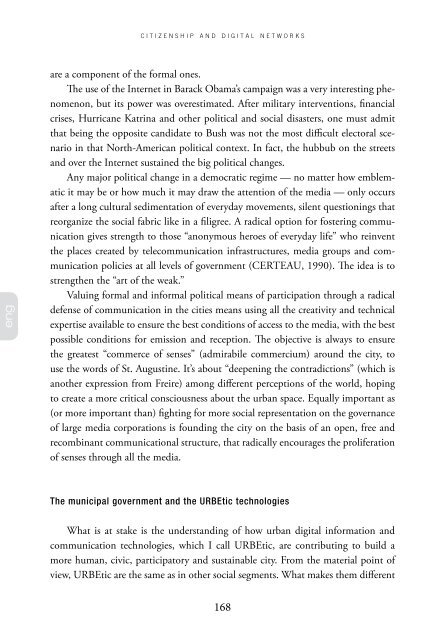Sergio Amadeu da Silveira - Cidadania e Redes Digitais
Sergio Amadeu da Silveira - Cidadania e Redes Digitais
Sergio Amadeu da Silveira - Cidadania e Redes Digitais
Create successful ePaper yourself
Turn your PDF publications into a flip-book with our unique Google optimized e-Paper software.
eng<br />
c i t i z e n s h i p a n d d i g i t a l n e t w o r k s<br />
are a component of the formal ones.<br />
The use of the Internet in Barack Obama’s campaign was a very interesting phenomenon,<br />
but its power was overestimated. After military interventions, financial<br />
crises, Hurricane Katrina and other political and social disasters, one must admit<br />
that being the opposite candi<strong>da</strong>te to Bush was not the most difficult electoral scenario<br />
in that North-American political context. In fact, the hubbub on the streets<br />
and over the Internet sustained the big political changes.<br />
Any major political change in a democratic regime — no matter how emblematic<br />
it may be or how much it may draw the attention of the media — only occurs<br />
after a long cultural sedimentation of every<strong>da</strong>y movements, silent questionings that<br />
reorganize the social fabric like in a filigree. A radical option for fostering communication<br />
gives strength to those “anonymous heroes of every<strong>da</strong>y life” who reinvent<br />
the places created by telecommunication infrastructures, media groups and communication<br />
policies at all levels of government (CERTEAU, 1990). The idea is to<br />
strengthen the “art of the weak.”<br />
Valuing formal and informal political means of participation through a radical<br />
defense of communication in the cities means using all the creativity and technical<br />
expertise available to ensure the best conditions of access to the media, with the best<br />
possible conditions for emission and reception. The objective is always to ensure<br />
the greatest “commerce of senses” (admirabile commercium) around the city, to<br />
use the words of St. Augustine. It’s about “deepening the contradictions” (which is<br />
another expression from Freire) among different perceptions of the world, hoping<br />
to create a more critical consciousness about the urban space. Equally important as<br />
(or more important than) fighting for more social representation on the governance<br />
of large media corporations is founding the city on the basis of an open, free and<br />
recombinant communicational structure, that radically encourages the proliferation<br />
of senses through all the media.<br />
The municipal government and the URBEtic technologies<br />
What is at stake is the understanding of how urban digital information and<br />
communication technologies, which I call URBEtic, are contributing to build a<br />
more human, civic, participatory and sustainable city. From the material point of<br />
view, URBEtic are the same as in other social segments. What makes them different<br />
168


